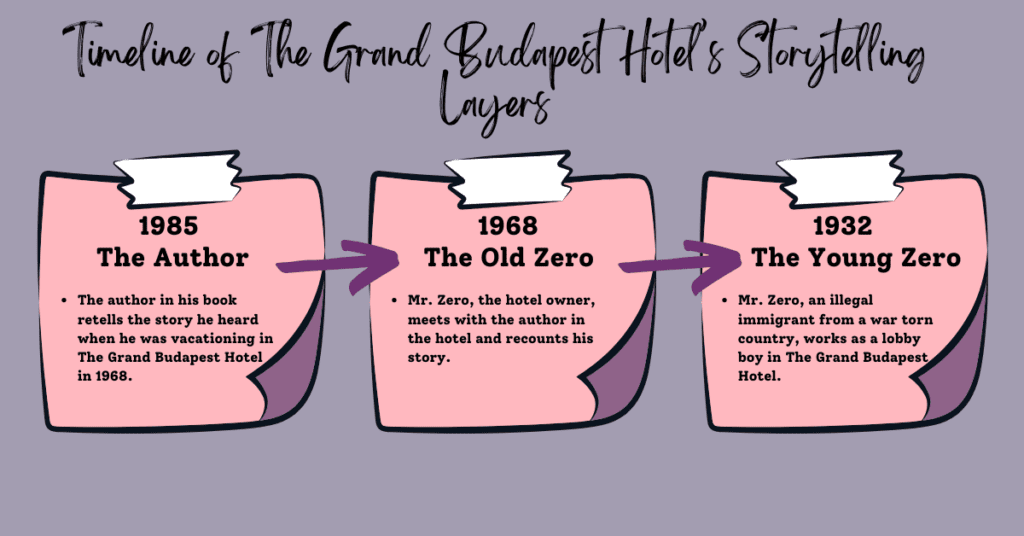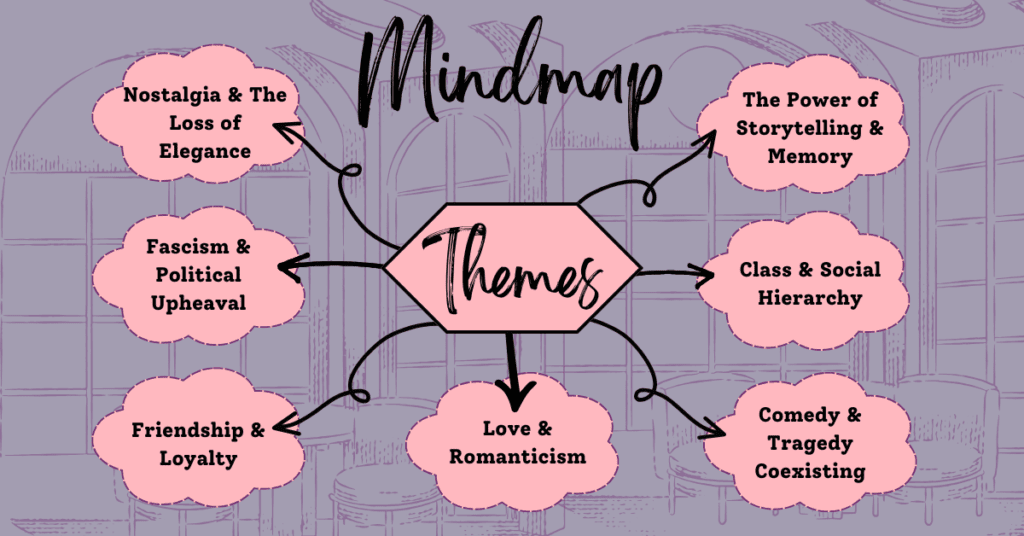Physical Address
304 North Cardinal St.
Dorchester Center, MA 02124
Physical Address
304 North Cardinal St.
Dorchester Center, MA 02124

Everyone has seen Wes Anderson’s cinematic masterpiece, The Grand Budapest Hotel, at least once in their lifetime. Wes Anderson’s unique cinematography requires us to pause every scene to appreciate it. In this article, we will present The Grand Budapest Hotel review, and we will discuss the movie’s underlying themes as well as my interpretation of them. Without further ado, let us begin.

Wes Anderson’s The Grand Budapest Hotel (2014) is a visually breathtaking film with profound underlying themes that lie beneath its whimsical and comic surface. I have discussed the themes found in the film below. Let’s take a look at it:-

At a glance, the theme that pops out the most is nostalgia and the loss of elegance. The characters of the film reminisce about a long-bygone era when the Grand Budapest Hotel was at its prime. The protagonist of the film, M. Gustave, embodies the manners, culture, and refinement of his time through his devotion to old-world charm. We can witness his dedication to his image in the comedic scene after his successful prison break when he chides Zero for forgetting to bring his iconic perfume, L’Air de Panache.
The old Mr. Zero Moustafa yearns for his past as he ritualistically books his old room in the hotel and stays there for a week every off-season. It’s his only connection to his past and memories of fonder times. Mr. Zero looks at his memories with a rosy lens. He glamorizes his past and views it positively, in reality, his past is filled with tragedy and struggles.
In The Grand Budapest Hotel, Wes Anderson cleverly portrays the longing for the past through the use of pastel vibrant colors whereas he portrays the present in dull muted colors. The contrast between the condition of the hotel in all its grandeur in the past (the 1930s) and the dilapidated hotel in the 1960s and 1980s shows that time erodes elegance, sophistication, and beauty.
In the movie, the past is not without its own set of problems. Fascism and political upheaval in the early 1930s disrupt the lives of M. Gustave and Zero. The fictional land of Zubrowka faces war and authoritarian rule. This situation parallels real-world historical shifts where the fictional “ZZ” fascist group resembles the “SS” group in Nazi Germany.
The fascist forces collaborate with Dmitri, son of the late Madame D., and upend M. Gustave’s life when he is falsely accused of murdering Madame D. and sent to prison. The rigid authority intends to crush the refined world of M. Gustave and succeeds in taking his life at the end of the film.
The Grand Budapest Hotel stands as a sanctuary in the middle of political turmoil; however, even it cannot avoid oppression or war. In the end, the fascist forces stay within the hotel and encroach on its property.
Wes Anderson masterfully incorporates the nested story, a story within a story within a story, as a literary device in his film. The film’s use of a layered structure highlights the importance of memory and the power of storytelling in preserving and passing down history and personal experiences.
The film begins in the year 1985 with the author of “The Grand Budapest Hotel” recounting the story of Mr. Zero Moustafa, the hotel owner, whom he met when he was vacationing in The Grand Budapest Hotel in 1968. Next, we see the film through the perspective of young Zero, an illegal war refugee, who is working as a lobby boy under the hotel’s concierge, M. Gustave.
The author becomes a mouthpiece who passes down the story he heard from Mr. Zero Moustafa, where he recounts how he went from poverty to wealth. The author becomes crucial in ensuring that M. Gustave’s legacy lives on.
The film shows the brotherly bond that develops between M. Gustave and young Zero. M. Gustave takes young Zero under his wing. Zero, as his young apprentice, learns lessons in different aspects of his life, ranging from romantic poetry to the duties of a lobby boy. The mentor-student bond between Gustave H. and Zero Moustafa is at the core of the film, built on mutual trust, admiration, and shared struggles.
Young Zero’s uncertain future as an illegal immigrant can be compared to his sitting on an unsteady boat in uncharted waters where M. Gustave tosses him a rope. Zero offers unwavering loyalty to Gustave, which reflects themes of gratitude and devotion in unstable times. Unfortunately, in the end, M. Gustave loses his life protecting him against the fascist forces. Zero is rewarded for his loyalty by M. Gustave who bequeaths his inheritance to him.
Wes Anderson shows a sharp contrast between the wealthy guests of the hotel and the underprivileged staff working for them. It emphasizes the distinction between privilege and labor. The film humorously satires the class and social hierarchy in society. Ironically, M. Gustave caters to the rich women of society and has power over them.
M. Gustave longs to be a part of the rich society. He wishes to become a part of the world he serves. He navigates the worlds of luxury and servitude, both commanding respect and serving the elite. He embodies their characteristics. He is eloquent and sophisticated, with manners appropriate for upper-class society. He can never go anywhere without his perfume, which is a symbol of luxury. Unfortunately, he is not regarded with respect by the rich, as evidenced by Dmitri’s treatment of him.
Zero and Agatha’s love story is a beautiful and profound one that transcends racial identity and time. His love endures and remains strong even in the face of loss. Zero takes care of the hotel as The Grand Budapest Hotel serves as the only connection to Agatha and is filled with memories of their love and happiness. Agatha helps Zero in freeing M. Gustave successfully and even helps in finding out the second will, which makes M. Gustave and later Zero wealthy.
M. Gustave’s love and poetic ideas are an important part of his charm. M. Gustave and Madame D. have a physical relationship, but it does not mean they do not love each other. Madame D. is often loving and more trusting towards M. Gustave than her own family and children. She bequeathed her fortune to him after her death. M. Gustave also harbors deep positive feelings towards her.
The Grand Budapest Hotel portrays humor with tragedy, war, betrayal, and death, showing that beauty often exists parallel to tragedy. The ideal world that M. Gustave and Zero wish for is an illusion and out of reach. Mr. Zero is a product of war, he escapes his country devastated by war but finds himself in the middle of another war which, just like his deceased family, claims the life of his beloved mentor M. Gustave.
At the end of The Grand Budapest Hotel, Mr. Zero Moustafa acknowledges that the world M. Gustave inhabited has already disappeared; however, “M. Gustave marvelously sustained the illusion of it.” M. Gustave’s witty demeanor hides the underlying sadness of the world.
To conclude, The Grand Budapest Hotel is a timeless cinematographic masterpiece that has underlying themes relevant even today. It is a visually stunning film that masterfully incorporates the themes of the power of the wealthy class, nostalgia, and the loss of elegance and values over time.
The Grand Budapest Hotel is a cinematic masterpiece that entices us to watch it again and again without getting bored. The Grand Budapest Hotel highlights the importance of preserving and passing down the memory and history of a long-lost golden era.
Click here to watch The Grand Budapest Hotel. If you want to read a review of the “When Life Gives You Tangerines” click here. If you liked this article, don’t forget to share it.